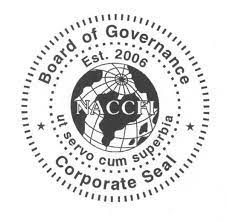The Evidenced Centered Design
The Evidenced Centered Design
The Evidence-Centered Design (ECD) is a construct for the development of evidenced based examination instruments used in credentialing. This design helps to clarify the rational and intended purpose of the examination and the psychometric empirical evidence required to make appropriate conclusions about the instruments validity, in accordance with the universally accepted Standards for Educational and Psychological Testing, developed jointly by the: American Education Research Association (AERA), the American Psychological Association (APA) and the National Council on Measurements in Education (NCME).
National Accreditation Standards
The NACCFI credentialing program is developed in compliance with the accreditation standards of the National Commission for Certifying Agencies (NCCA). The NCCA is responsible for promoting and enforcing regulatory standards of excellence for voluntary and statutory credentialing programs. The NCCA was established in 1977 in cooperation with the federal government.
Credentialing Core Requisites
There are three primary core requisites considered essential for all professional certification applicants. They include; evidence of practice competency, good moral character and a commitment to maintain and enhance their practice skills.
Practice Competency
Practice competency requires the applicant to show evidence of having the entry level core knowledge competencies and skill sets believed necessary to do the work of the profession safely and effectively. Competency is typically evidenced by the applicant showing proof of actual work experience, professional training related to the practice and the application of a performance or competency examination designed to credibly measure the applicant’s knowledge competency.
Good Moral Character
Good moral character requisites are designed to provide the general public some reasonable assurances that the applicant is of good moral and ethical character, particularly when their practice involves working with children. Moral character is typically measured by a requisite for character endorsements from the applicant’s professional peers and supervisors, a criminal history background check, a commitment by the applicant to abide by a code of professional principles, values and code of ethical conduct and a process designed to allow the general public a means of reporting unethical or harmful.
Credentialing Renewal Process
Certifications applicants are required to renew their credentials every two years in order to show that they are active in the work of the profession and are committed to enhance their skill sets by showing evidence of participating in continuing education training, supervision, mentoring or peer review by other more experienced practitioners.
To Download the;
2012 practice job and Item analysis [Click Here]
The Competency Examination Task Force Bios [Click Here]
- Home
- Applicant Handbook
- Application Forms
- Training On-Site
- Evidence Based
- Training On-line
- Certified Trainers
- How to Report
- Examination
- Member Registry
- Interview Structure

Certification Board Bios
Hector M. Campos LCSW, DCFI Clinical Social Worker Fredericksburg, Virginia Board Chairman
Joan Carter JD MSW Attorney Arlington, Virginia Board Vice Chairman
Kelly Bober DCFI CAC Executive Director Winchester, Virginia Board Secretary
Naomi Lau LCSW DoD Program Analyst Arlington, Virginia Board Treasurer
Sylvia Aldaz DCFI, LSAA CAC Director New Mexico Professional Member
Christina DiMeglio PsyD Psychologist Boston, Mass Professional Member
Daryl B. Leach LCSW, DCFI Child Forensic Interviewer Rockville, Maryland Professional Member
Lisa Mitton LCSW Child Forensic Interviewer Twin Falls, Idaho Professional Member
Barbara Craig MD, FAAP Director AFCCP Bethesda, Maryland Professional Member
Jackson C. Knox Community Organizer Richmond, Virginia Public Member
Jackson C. Knox Community Organizer Richmond, Virginia Public Member
Examination Task Force Bios
Johanna Hager LCPC, DCFI CAC Executive Director Morison, Illinois
Hector M. Campos, LCSW DCFI Clinical Social Worker Fredericksburg, Virginia
Christina Copland M.S. Ed. Child Forensic Interviewer Maryville, Tennessee
Ann D. Goodall LBSW, ACFI Social Work Specialist Child Forensic Interviewer Topeka, Kansas
Leslie Vassilaros, LSW, DCFI CAC Executive Director Wheeling, West Virginia
Michele Thames, DCFI Child Forensic Interviewer Norfolk, Virginia
Kelly Bober, DCFI CAC Executive Director Winchester, Virginia
Paul D. Naylor, PhD Psychometric Consultant Durham, North Carolina
Daryl B. Leach LCSW, DCFI Child Forensic Interviewer Rockville, Maryland
Lisa Mitton, LCSW Child Forensic Interviewer Twin Falls, Idaho